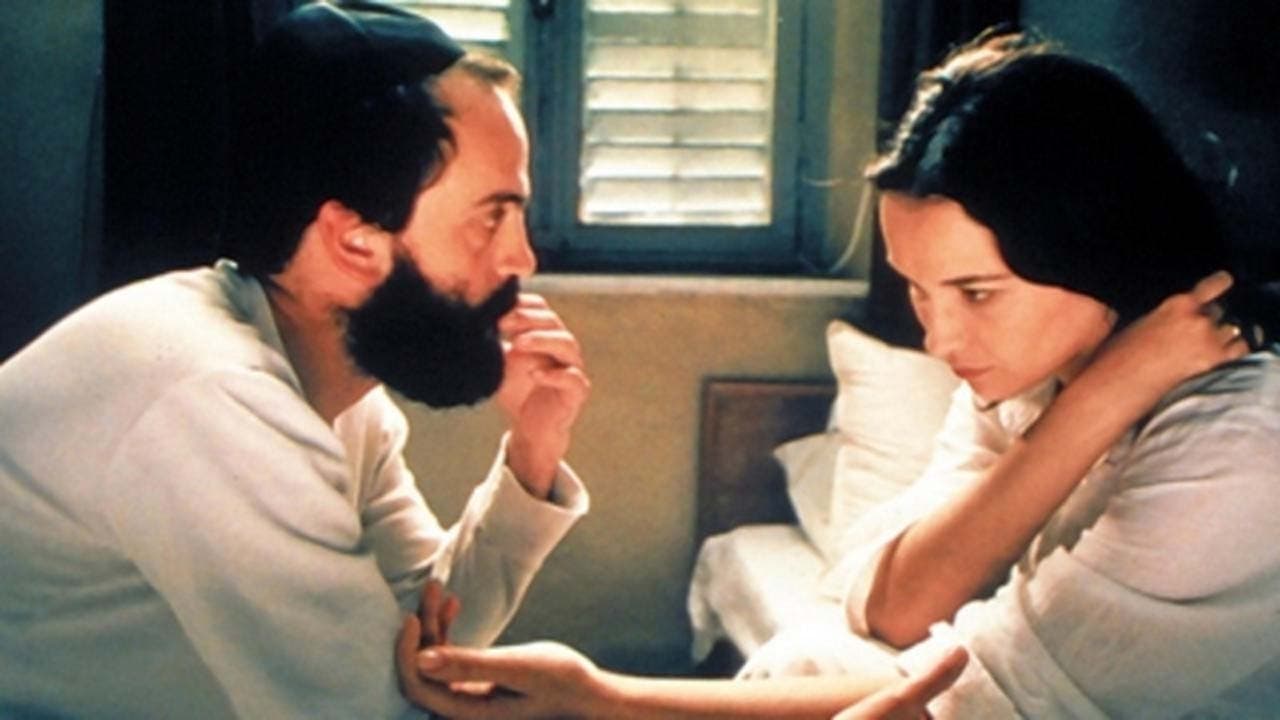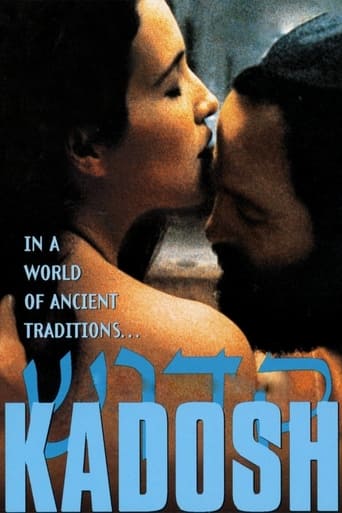

'Kadosh' is a tragedy; the tragic hero is Meir, who is induced or forced to divorce his wife Rivka because she is barren for 10 years. A lesser tragic hero is his sister-in-law Malka, who is forced into a loveless marriage with the fanatic Yussuf, who beats her because she is deceptive and unfaithful. The main actors did great jobs--the love of the sisters at the end was amazingly portrayed. The point of the film--that ultra-orthodox Judaism is misogynistic--is made with considerable nuance if not balance, and the world of ultra-orthodoxy is explored intriguingly, if not always clearly for a non-Jew.I am writing this review mainly because of disdain for some other reviewers' defense of the ultra-orthodox practices and beliefs critiqued by this film. (Perhaps it needs saying that no, I'm not an anti-Semite--I even believe, despite my preference for separation of church and state, that a _Jewish_ state of Israel _needs_ to exist, as a haven from the deep-seated and contagious bigotry of other groups against Jews.) Reviewers complain that the film doesn't show the complexity or loving relations in ultra-orthodox families, and that it is biased toward secular or 'capitalist' (!) social currents.Now, in some ways, I agree: the film oversimplifies, and Yussuf is almost a caricature. (I never saw/heard a truck with loudspeakers extolling services during my short stays in Jerusalem or Tel Aviv, though I have--not extolling Jewish services--in Chicago.) Though I don't doubt for an instant that many powerful figures in religious and other institutions, in and out of Israel, are striking copies of him--for examples with less power, one need only turn on US talk radio. A work of art can be great and noble even though, and perhaps because, it makes characters overly simple and portrays actions unrealistically--I'll stop with 'Inherit the Wind' and 'To Kill a Mockingbird'.But talk about a secular or capitalist bias reveals the blindness of these reviews: no, the real contrast point to orthodox religion is individualistic democracy: the right of each member to be treated as basically equal, to choose their own beliefs and family practices (absent harm to others) without facing organized oppression, exclusion, or condemnation, and the requirement that important social institutions forswear bias and exclusion insofar as possible. A religion (or political party) that says blacks or gays or even women are second-class should face legitimate condemnation based on the clear evidence of history that it inevitably is rooted in fears and even more shameful emotions, and that it has soul-corroding consequences for everyone it involves.The problem with the negative reviews can be highlighted by comparing Kadosh with the recent film--'12 Years a Slave'. Defenders of slavery would surely complain that that film was very biased against the Southern plantation system, that many whites in it were caricatures, and that relations on Southern estates were complex, including lots of love and family warmth that nurtured blacks while ensuring that they fulfilled the important social function of producing more slaves to keep plantations going and free slave-owners for important cultural pursuits. I saw such arguments in the US even in the 1950s--vicious and ridiculous, surely, but more importantly they're beside the point--even if a social institution is a joy to the world, every human has the right to choose to oppose it, to live outside its norms if living so doesn't harm others, and every person has the right not to be brainwashed or mass-pressured into forgoing real alternatives to those institutions.
... View MoreImagine if I were to make a movie about women, and in this movie, the women all secretly meet and plan how to make their guys' lives miserable, and then have a lesbian fling to make themselves feel better. And I film this as a serious drama with real people and situations. Because I take it seriously, I add scattered technical details that I picked up from various sources about women and their menstrual cycles throughout the movie to prove that I know what I am talking about.All I would be doing, obviously, is showing my immaturity, ignorance, misogyny, and an approach to tackling a subject that is too silly to even be called a straw-man approach. The above hypothetical movie would be hilariously pathetic.And that's what this movie experience was like for me. I lived for a while in these orthodox religious circles so I know what I am talking about. But you don't need experience to realize that this movie is completely ridiculous. After the first ten minutes of disgust, I found myself laughing for the next 90 minutes at the movie and at Amos Gitai.To list the inaccuracies in this movie would take pages, but, believe it or not, that is not the primary problem with this movie. The problem with this movie is that it is a hateful movie for secular people to fuel more hatred and to feel superior to the orthodox with easy and very crudely drawn targets.Yes there are religious wife-beaters and clueless insensitive men and other various social problems in the orthodox religious world. Yes, this topic could theoretically be handled in a good movie by the right person. But this is definitely not that movie. As described above, this movie is the equivalent of a misogynist making a movie about women, basing it on the fact that there are real bitches out there that did horrible things to men. And then calling the movie 'Female' ('Kadosh' means 'holy' - obviously a crude and very cheap provocation).As an example of one of the many problems with this movie, Abecassis is supposed to be an insider brought up in a religious family, but she constantly acts as an outsider who has not even minimal regard for anything religious. She is obviously Gitai's mouthpiece, providing the intended secular audience a persona they can project themselves onto.As another example, the sex scene was so hilariously over the top I rewound it a couple of times and still couldn't stop laughing. Here is an ultimately sensitive topic of marital rape, and yet I couldn't stop laughing, because the guy was jumping up and down on her as if he were on a trampoline. Obviously Gitai doesn't know about the training orthodox men go through before a marriage and the years of study in books that always emphasize gentleness and sensitivity. If the man were depicted as a boorish lout whose insensitivity led to rape, then that would be one thing. But this violence came out of nowhere like he were a jack-in-the-box bouncing rapist, because, as we all know, all religious men are violent rapists right?If you think all religious orthodox Jews are backwards, clueless fanatics and misogynists that don't even go to doctors (does Gitai think they are Amish?), then this movie will be right up your alley. If, on the other hand, you have some intelligence, low bias, and a certain level of maturity, this movie will make you laugh.
... View More...if those people watch movies, that is. "Sacred" is the simple story of two Orthodox Jewish couples living in Jeruselem who are having problems with the lifestyle. The first, Liev and Rivka, are childless with Liev silently blaming Rivka. The second, Yossef and Malka, are a miserable match made by Malka's mother; Malka does not want to be married, and Yossef would rather be more comfortable driving about town in a truck with loudspeakers on it, imploring Jews to come to the run-down synagogue while handing out Orthodox liturature. The source of Malka's dislike of marriage lies with Yaakov, who used to study at the yeshiva with Liev and Yossef, but joined the army and drove a tank around Lebanon. She loves him, but cannot leave the group, or so she thinks. On top of this, the Rabbi is pressuring Liev to annul his marriage because he thinks Rivka is barren. The problem with "Kadosh" is the same one that "The Holy Land" suffers from: once the film introduces all the characters, you just know what is going to be the end result. I have to agree with the reviewers that Gitai takes one point (Patriarchy is bad) and beats it to death. Like other reviewers, I wish that Gitai would have shown us a little of the joys of Orthodox living, unless that is the director's other point, i.e., that being Orthodox is a lot like being an Objectivist. Definitely the bummer movie of 1999.
... View MoreHere is a film which clearly banks on being marketed as exotica to audiences unfamiliar with its subject matter.An attempted hybrid of fiction and document, "Kadosh" clumsily falls in between the chairs. As a documentary, on the one hand, it is neither accurate nor insightful. To realize its sloppy handling of detail, one needs to go no further than the opening scene where it is quite obvious that the ultra-orthodox protagonist does not know even so much as how to properly put on his t'filin. More generally, the tedious rote-style presentation of details (in this case of Jewish ultra-orthodox ritual) is the role of a manual, not of a good documentary; the latter should provide an organizing principle (a gestalt, if you will) for the viewer, so that she may emerge with a better understanding of the viewed. This clearly does not happen here, as ultra-orthodox ritual is being made even more enigmatic. The director seems to have done a decent job explaining it all verbally during the film's release campaign; cinematically, however, this is a severe case of stuttering. As a fiction-feature, on the other hand, it suffers from flatness of character, simplicity of plot and bluntness of message. At some points I felt I was watching a cartoon. (e.g. the wedding night consummation scene - without going in detail into angles, positions and dimensions ... well, technically this could not possibly be a realistic portrayal of human sex, savage as it may be.)There are no subtleties in this film. The clever manipulation of hints, stimulating the viewer's imagination and thought into taking an active part in the cinematic text, which I believe is a mark of a good feature, is completely absent. On the contrary: watching the movie I felt, at times, as being force-fed again and again with the same already chewed-up and way-too-obvious content. It is, indeed, as director Gitai himself put it in an interview, an architectural "shifting objects in space", and then coloring the scenes with the appropriate emotions when called for and advancing the plot on its appropriate and predictable track; but the spark, that creative, duende-like dark, inarticulable spark (let's not forget "Kadosh" is supposedly a tragedy), that which casts on a two-dimensional screen the spell which turns it into an extension of the viewers world, is missing without a trace. Perhaps a work of a visual-engineer, perhaps of an unsophisticated ideologue; definitely not of a true filmmaker. What I saw was a passion-play for animated issues rather than flesh-blood-and-complexities real people. The acting, by and large, failed to transcend this directorial flatness of an idea forced (at times even tortured) into film. One notable, though relatively minor, exception was that of the mikve-lady and the mother, both played by the excellent and seasoned Lea Koenig.It takes more than strict adherence to a winning formula (namely, a serving of exotica, plus heart wrenching yet simple melodrama, plus a popular agenda, preferably politically correct) to tantalize my interest buds. The bottom line here, all being said, is that for a considerable portion of the movie I was simply bored. In spite of the novel, perhaps even pioneering achievement of using an ultra-orthodox neighborhood as a movie set, for which Mr. Gitai and his crew deserve all praise, I found "Kadosh" way too Nadosh (Hebrew for "trite").
... View More